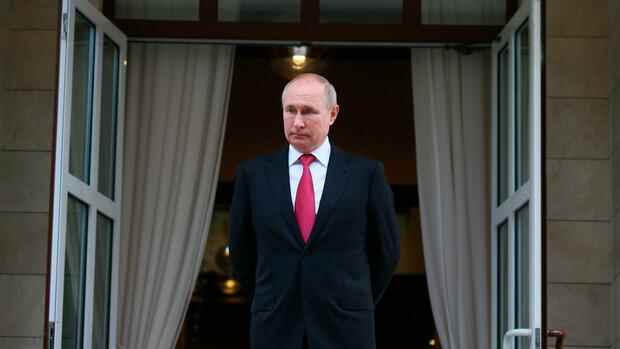The Russian President is the spider in the global energy network.
(Photo: dpa)
All too often the cartel of the oil exporting countries, the OPEC, has been declared dead. Incidentally, at least as often as the historically highest oil production (“peak oil”) was forecast. Neither has happened to this day. On the contrary: Opec continues to be powerful and is happy about rising oil prices.
At the beginning of the corona pandemic, it initially looked as if Opec and all other oil-producing countries were going to have big problems – the oil price fell significantly due to broken supply chains, dormant factories and employees working from home. But then OPEC joined forces with Russia, Kazakhstan and other countries that produce oil but are not members of the cartel to form the OPEC plus group – and from then on, prices were driven together.
Opec-plus is the historical alliance of two archenemies: Russia and Saudi Arabia. The Kremlin is helping the world’s largest oil producer to balance prices and production volumes. This avoids the big producers simply increasing their production on their own, a new race for sales markets breaking out and prices getting completely out of hand.
Russian corporations are making record profits
Both benefit from this: the permafrost land and the desert state.
Top jobs of the day
Find the best jobs now and
be notified by email.
Russia, however, is benefiting more from the current sharp rise in prices and the stabilization through an Opec-plus agreement: Moscow’s corporations such as Rosneft, Lukoil, Gazprom and Surgutneftegas are not only among the world’s top oil producers. As the world’s largest natural gas exporter and major coal producer, Russia is also benefiting from the price boom on the global energy markets and is expanding its influence with the controversial Nord Stream 2 pipeline.
Russia is the spider in the web in the energy world.
Despite all the sanctions for the annexation of the Ukrainian peninsula of Crimea and the military interference in eastern Ukraine, Moscow is financially unassailable at the moment. 600 billion dollars in currency reserves, a well-stocked sovereign wealth fund and currently expected budget surpluses strengthen Putin. He can easily pay for his expansionist policies, the modernization of his army and the expansion of the Russian oppressive apparatus.
Europe needs a new energy strategy
Above all, the transfers from Europe, which is heavily dependent on Russian oil, gas and coal, consolidate the Putin system – actually an undesirable effect, since the EU is officially pursuing a course of sanctions against the Kremlin.
However, this cannot be changed at the moment. There is no alternative to oil and gas from Russia. Because liquefied natural gas (LNG) from Qatar or the USA is significantly more expensive and hardly available due to the booming demand from Asia.
But Europe’s politicians and companies should learn one lesson from the current situation: In the post-oil era, dependence on Russia should be reduced as a matter of urgency. Specifically, for the current plans for a hydrogen strategy, this means that Germany and the EU are only promoting the development of renewable energies and the production of hydrogen in other countries: in the Ukraine, North Africa and other neighboring countries on the old continent.
This benefits not only the countries concerned, but also Europe and its companies: this cooperation strengthens and stabilizes the European neighborhood. In the long term, this makes very good political and economic sense, but above all for reasons of climate protection. Because Russia wants to push hydrogen from natural gas and nuclear power into the market, in case of doubt significantly cheaper, in order to beat rivals like Ukraine or Morocco out of the field. However, Europe must absolutely resist these temptations – above all because of climate protection.
More: Can more oil alleviate the energy price crisis in Europe?
